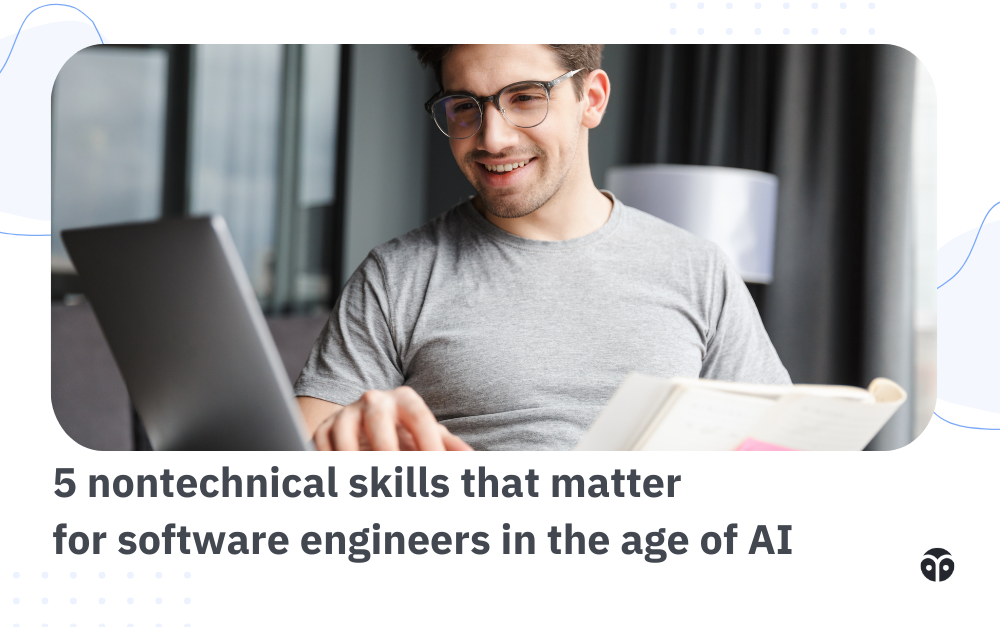5 nontechnical skills that matter for software engineers in the age of AI
As AI handles more coding, nontechnical skills like product thinking, communication, and curiosity are key for engineers to stay irreplaceable.

AI is getting better at writing code, but writing code has never been the whole job.
The best engineers have always done more. They make judgment calls, weigh tradeoffs, work through ambiguity, and bring others along.
Now that AI is handling more of the straightforward work, those human skills are even more important. We’re seeing a spotlight on a different kind of leverage: nontechnical skills that help engineers solve real problems, work effectively on teams, and navigate complexity. They’re what helps you stay effective, collaborative, and hard to replace.
Here are five that stand out.
1. Product thinking
When AI can generate dozens of possible implementations, it’s your product sense that determines which one makes sense.
Strong engineers already think beyond code, understanding how users interact with the product, what tradeoffs are acceptable, and how changes ripple across the system. In an AI-driven workflow, this skill gets amplified. You might be shipping faster, but that also means the margin for misalignment grows.
Product-minded engineers ask questions like:
- What problem are we solving?
- How will we measure whether this actually worked?
- What does “done” look like from the user’s perspective?
As AI handles more of the building, product thinking becomes the compass.
2. Communication
The more we automate, the more important it is to communicate clearly, especially across functions.
Whether you’re explaining a bug to a PM, reviewing a teammate’s AI-generated PR, or aligning with design on a constraint, strong communication creates leverage. You avoid rework. You move faster. You build trust.
This doesn’t mean writing novels in Slack. It means being able to summarize a decision with context, translate technical constraints into business terms, and give constructive, actionable feedback
3. Problem decomposition
AI tools can autocomplete functions, generate test scaffolding, and even suggest architectural patterns. But they’re still bad at figuring out what needs to be done and in what order.
That’s where problem decomposition comes in.
Strong engineers break down big problems into solvable chunks, define interfaces, and make the path clear. This kind of thinking is also what lets you use AI effectively: if you can describe a task well, you can prompt well. If you know what to isolate, you know when to bring the tool in.
4. Prioritization and judgment
AI can suggest, summarize, and even generate. But it can’t tell you what’s important.
One of the most underrated skills in engineering is knowing what not to do. Great engineers zoom out and make decisions based on time, risk, value, and team goals. They resist the temptation to polish the unnecessary or over-optimize what doesn’t matter yet.
This becomes even more important as AI speeds things up. You can generate 10 possible implementations, but which one balances speed, clarity, and future maintenance? You can automate testing, but which parts of the codebase really need it?
AI gives you options. Judgment helps you choose wisely.
5. Curiosity
AI is changing workflows fast. That means the engineers who stay adaptable are the ones who stay curious.
The most successful engineers we’ve seen at Formation don’t treat AI as a threat —they treat it like a new toolset to explore. They try, test, discard, and learn. They ask how tools work, what changes, and where the sharp edges are.
You don’t need to be the first person on every hype train. But you do need to keep learning, experimenting, and sharing what you find.
Curiosity helps make you future-proof.
Standing out in 2025 and beyond
If you’re an engineer looking to grow in your role or move into a new one, these are the skills that will set you apart. AI might be leveling the playing field for coding speed, but nontechnical skills still separate good engineers from great ones.
And if you’re managing engineers, these are the skills to look for, encourage, and develop. Because they’re not going out of style anytime soon.
Get holistic interview prep with Formation
The Formation Fellowship gives mid-level and senior engineering job seekers everything they need to land their dream roles — including personalized skill brush-ups, resume help, unlimited mock interviews with experienced software engineers and hiring managers from top-tier tech companies, career and negotiation support, and more.
If you’re having trouble navigating your job search on your own, apply here and get unconditional support from a team of engineering mentors, technical recruiters, career coaches, and more.



